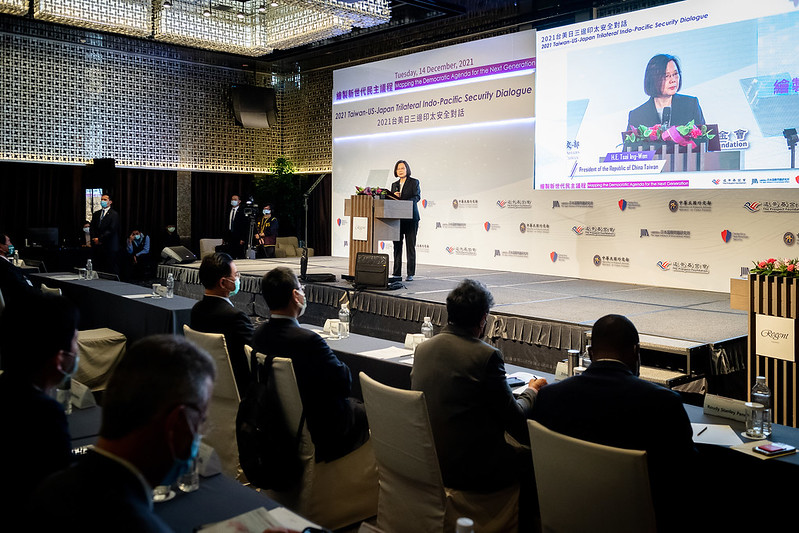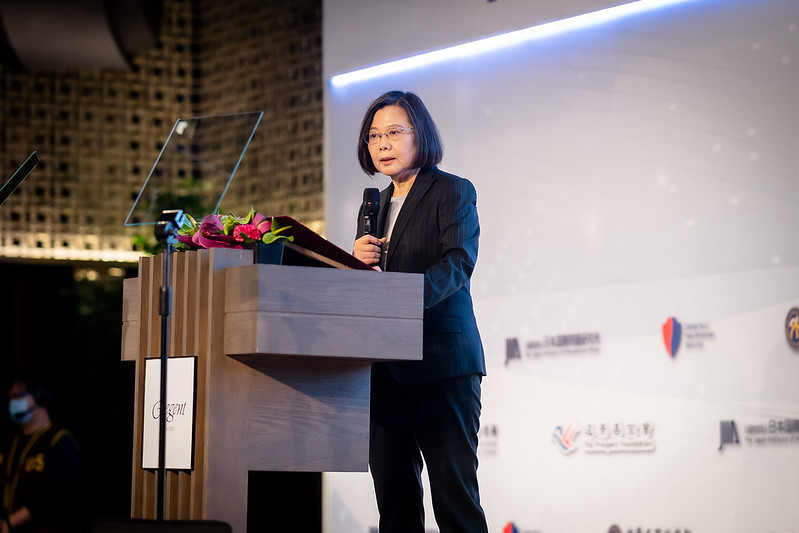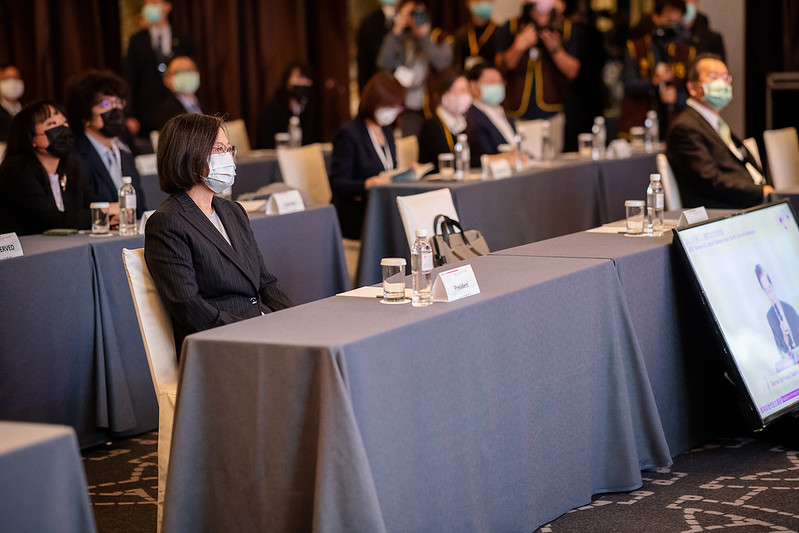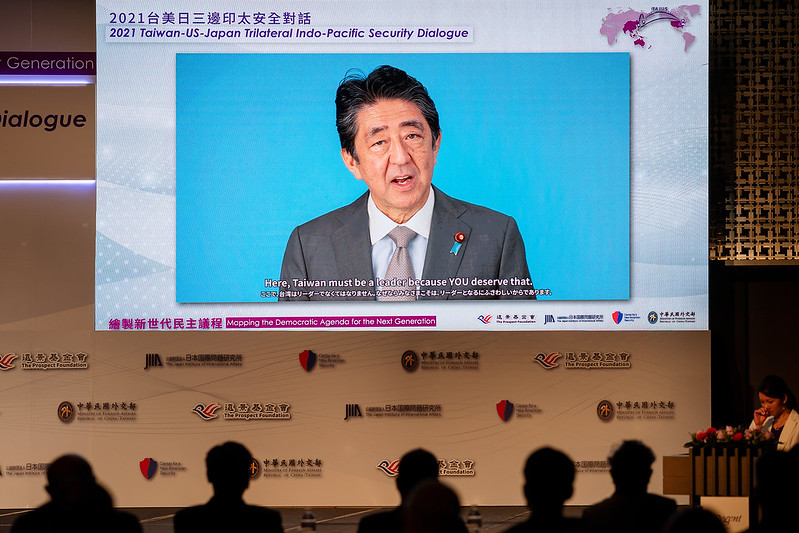News & activities
 News releases
News releases
On the morning of December 14, President Tsai Ing-wen attended the opening of the Taiwan-US-Japan Trilateral Indo-Pacific Security Dialogue. In remarks, the president said that although Taiwan is faced with extraordinary challenges, we will not bend to pressure, and will continue to work with like-minded partners to maintain a secure, peaceful, free, and open Indo-Pacific region.
A transcript of President Tsai's remarks follows:
First, I would like to extend a warm welcome to all joining us virtually and in person for this year's Indo-Pacific Security Dialogue. I would also like to take this opportunity to thank the Prospect Foundation, the Center for a New American Security, and the Japan Institute of International Affairs for organizing this important event.
My special thanks to former Prime Minister [Shinzo] Abe and Deputy Assistant Secretary [Scott] Busby for your participation today. Thank you for taking the time to join us and for continuously voicing your support for Taiwan's security and democracy. I look forward to listening to your talks today.
Today is the third time I am delivering the opening remarks for this dialogue. Last year at this dialogue, I described 2020 as one of the most challenging years in our history, but at the same time, it was also defined by courage, warmth, and friendship. This year, as we gather here again, we are still facing many similar challenges. This year, however, can also be defined by even greater cooperation between Taiwan and like-minded democracies around the world.
As Taiwan assisted the international community with materials and equipment essential to slowing down the spread of COVID-19, the United States and Japan came to Taiwan's aid with donations of 8.2 million vaccines at the most critical times. Our democratic friends from Europe, such as the Czech Republic, Poland, Slovakia, and Lithuania, soon followed suit with their own donations. For that, I want to again express my gratitude.
Furthermore, in the past few months Taiwan welcomed delegations from the European Parliament, France, Slovakia, and the Baltic States. These delegations came to Taiwan not only for discussions on further collaboration between our countries; they were also here to demonstrate solidarity with their democratic partner. As one of the parliamentarians from Lithuania said during the Open Parliament Forum last week, "We are small, but we are strong, and when we join hands, we are even stronger." And last month, we witnessed the establishment of Taiwan's representative office in Lithuania.
Last week, Taiwanese government representatives and members of civil society also participated in the Summit for Democracy hosted by the United States. Our representatives, Ambassador Bi-khim Hsiao (蕭美琴) and Digital Minister Audrey Tang (唐鳳), shared Taiwan's story of resilience and achieving democracy. Minister Tang also presented Taiwan's experience in combating the COVID-19 pandemic by utilizing digital technology, while safeguarding our democratic institutions and values. They also related Taiwan's commitment to fight corruption, defend against authoritarian intrusion, and promote respect for human rights in our region and around the world.
Our message to the world is clear: no amount of external pressure can shake our efforts and commitment to freedom, human rights, the rule of law, and particularly partnering with the international democratic community. We will continue to work with our partners to maintain a secure, peaceful, free, and open Indo-Pacific.
As the world deals with the third and fourth waves of COVID-19 infections, and most recently, the emergence and spread of the Omicron variant, our work on global economic recovery and restructuring secure global supply chains has become even more pressing and important. And, Taiwan is ready and capable to play a critical role in facilitating and assisting with this grand endeavor.
With the close relationships between Taiwan, the United States, and Japan, the deepening of economic partnerships should also be our priority. We plan to work with the US, Japan, and other like-minded partners with shared strategic interests to revamp supply chains and produce high-tech products to help regional and global economic recovery.
With the resumption of TIFA (Trade and Investment Framework Agreement) talks in June and the conclusion of the second annual Taiwan-US Economic Prosperity Partnership Dialogue, last week, the US Secretary of Commerce and Taiwan's Minister of Economic Affairs also jointly announced the Technology Trade and Investment Collaboration framework, aimed at developing commercial programs and exploring concrete actions to strengthen critical supply chains. In addition, in September, Taiwan applied to join the Comprehensive and Progressive Agreement for Trans-Pacific Partnership, that is the CPTPP. We are grateful for Japan and former Prime Minster Abe's support and endorsement in this effort.
Taiwan's bid to join this trade mechanism with high standards is a demonstration of our determination to be incorporated in the regional economic network. It is also our hope that our membership can serve as the start of a more significant contribution to regional economic development and revitalization. Moreover, as Asia's hub of technology and with the versatility and flexibility of Taiwan's economy, Taiwan can play a crucial role in key areas like digital economy, supply chain resilience, 5G network security, quality infrastructure, and clean energy.
The last two years have been difficult for all countries. And all these challenges persist, as we continue discovering new variants of the coronavirus, while racing to vaccinate our population. Authoritarian regimes' intrusion to our way of life and institutions has intensified. But this trend has also served as an important wake-up call for democracies.
Although extraordinary challenges remain, and will probably stay with us for quite a while, democracies have also been working together to safeguard the values and institutions we treasure. Our alliances are also being rekindled to serve the interests of the international community.
I want to conclude my talk by saying, Taiwan may be small in terms of territory, but it has proven that Taiwan matters to the region and the world. Taiwan has persevered in the face of existential threats and become an indispensable part of the Indo-Pacific. Our commitment to democracy has never been stronger, and we will not bend to pressure. As Taiwan continues to accumulate support from like-minded partners, we will also not shy away from challenges, and want to be regarded as part of the solution for the international community.
Lastly, I wish today's dialogue great success. I also hope all the participants use this event to discuss and strategize on important issues that are pressing to our citizens' well-being and our countries' futures. Have a wonderful holiday season, and I very much look forward to welcoming Prime Minister Abe and Deputy Assistant Secretary Busby to Taiwan in the near future.
National Security Council Secretary-General Wellington Koo (顧立雄), Foreign Minister Joseph Wu (吳釗燮), and Prospect Foundation Chairman Mark Chen (陳唐山) and President Lai I-Chung (賴怡忠) were also in attendance at the event. Former Japanese Prime Minister Shinzo Abe and Deputy Assistant Secretary Scott Busby of the US State Department Bureau of Democracy, Human Rights, and Labor also delivered keynote speeches via video.












